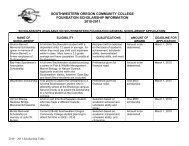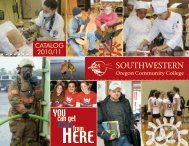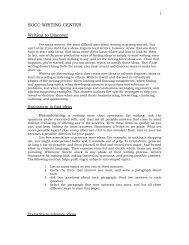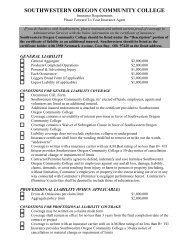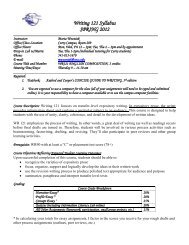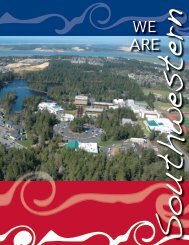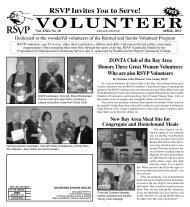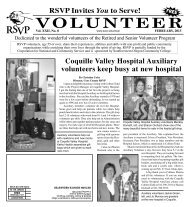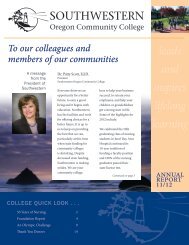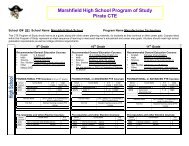Part 1 3.7.qxp - Southwestern Oregon Community College
Part 1 3.7.qxp - Southwestern Oregon Community College
Part 1 3.7.qxp - Southwestern Oregon Community College
You also want an ePaper? Increase the reach of your titles
YUMPU automatically turns print PDFs into web optimized ePapers that Google loves.
Course Descriptions<br />
NRS222 Foundations of Nursing in Acute Care II<br />
and End-of-Life<br />
9 credits (4 lec, 9 lab, 4 lec-lab hrs/wk)<br />
This course builds on Nursing in Acute Care I, focusing<br />
more on complex and/or unstable patient care situations,<br />
some of which require strong recognitional skills rapid<br />
decision-making, and some of which may result in<br />
death. The evidence base supporting appropriate<br />
focused assessments, and effective, efficient nursing<br />
interventions is explored. Lifespan factors, cultural<br />
variables, and legal aspects of care frame the ethical<br />
decision-making employed in patient choices for<br />
treatment or palliative care within the acute care setting.<br />
Case scenarios incorporate prioritizing care needs,<br />
delegation and supervision, family and patient teaching<br />
for discharge planning. Exemplars include acute<br />
psychiatric disorders as well as acute conditions affecting<br />
multiple body systems. Includes classroom and clinical<br />
learning experiences.<br />
Prerequisite: NRS112, NRS231 and NRS233 with a “C”<br />
or better.<br />
NRS224 Scope of Practice and Preceptorship for<br />
AAS Completion<br />
9 credits (4 lec, 15 lab, hrs/wk)<br />
This course is designed to formalize the clinical<br />
judgments, knowledge and skills necessary in safe,<br />
registered nurse practice. The preceptorship model<br />
provides a context that allows the student to<br />
experience the nursing work world in a selected<br />
setting, balancing the demands of job and lifelong<br />
learner. Faculty/preceptor/student analysis and<br />
reflection throughout the experience provide the student<br />
with evaluative criteria against which they can judge<br />
their own performance and develop a practice<br />
framework. Includes seminar, self-directed study and<br />
clinical experience. Required for AAS and eligibility for<br />
RN Licensure.<br />
Prerequisite: NRS221 with a “C” or better.<br />
NRS230 Clinical Pharmacology I<br />
3 credits (3 lec hrs/wk)<br />
This is the first course in a two course sequence. This<br />
course introduces the theoretical background that<br />
enables students to provide safe and effective care<br />
related to drugs and natural products to persons<br />
throughout the lifespan. Students will learn to make<br />
selected clinical decisions regarding using current,<br />
reliable sources of information, monitoring and evaluating<br />
the effectiveness of drug therapy, teaching persons from<br />
diverse populations regarding safe and effective use of<br />
drugs and natural products, intervening to increase<br />
therapeutic benefits and reduce potential negative<br />
effects, and communicating appropriately with other<br />
health professionals regarding drug therapy. Drugs are<br />
studied by therapeutic or pharmacological class using an<br />
organized framework.<br />
Prerequisite: NRS110 with a “C” or better.<br />
Concurrent: NRS111 and NRS232.<br />
NRS231 Clinical Pharmacology II<br />
3 credits (3 lec hrs/wk)<br />
This is the second course in the pharmacology<br />
sequence. Clinical Pharmacology II continues to provide<br />
the theoretical background that enables students to<br />
provide safe and effective care related to drugs and<br />
natural products to persons throughout the lifespan.<br />
Students will learn to make selected clinical decisions<br />
regarding using current, reliable sources of information,<br />
monitoring and evaluating the effectiveness of drug<br />
therapy, teaching persons from diverse populations<br />
regarding safe and effective use of drugs and natural<br />
products, intervening to increase therapeutic benefits and<br />
reduce potential negative effects, and communicating<br />
appropriately with other health professionals regarding<br />
drug therapy. The course addresses additional classes of<br />
drugs and related natural products not contained in<br />
Clinical Pharmacology<br />
This course starts with drugs related to the renal<br />
system and includes drug name, drug intended actions,<br />
side effects, drug interactions, and nursing management,<br />
including teaching plans for clients. A review of anatomy<br />
and physiology for each system is also included.<br />
The course covers related nursing diagnoses and<br />
collaborative nursing problems. Other drugs included<br />
are hypertensives, hyperlipidemias, diuretics, and<br />
vasodilators. The respiratory system starts with drugs<br />
related to the nasal passage mucous membranes down<br />
through the lungs. Drugs for asthma and other COPD<br />
diseases, GI system (upper and lower) diseases and<br />
problems, endocrine system drugs including the<br />
pancreas, endocrine and exocrine glands. Diabetes<br />
Mellitus drug therapy and treatments are covered<br />
extensively. The immune system in relation to the<br />
inflammatory response and drugs that effect the<br />
response, are explored such as immunosuppressives.<br />
The last major system covered is the immune system<br />
as it relates to the various forms of cancer and<br />
subsequent infections. Antitubercular and antival drugs<br />
are also covered.<br />
Prerequisite: NRS111, NRS230, NRS232 with a “C”<br />
or better.<br />
Concurrent: NRS112 and NRS233.<br />
NRS232 Pathophysiological Processes I<br />
3 credits (3 lec hrs/wk)<br />
This course introduces pathophysiological processes<br />
that contribute to many different disease states across<br />
the lifespan and human responses to those processes.<br />
Students will learn to make selective clinical decisions<br />
regarding using current, reliable sources of<br />
pathophysiology information, selecting and interpreting<br />
focused assessments based on knowledge of<br />
pathophysiological processes, teaching persons from<br />
diverse populations regarding pathophysiological<br />
processes, and communicating with other health<br />
professionals regarding pathophysiological processes.<br />
Prerequisite: NRS110 with a “C” or better.<br />
Concurrent: NRS111 and NRS230.<br />
<strong>Southwestern</strong> <strong>Oregon</strong> <strong>Community</strong> <strong>College</strong> 2006-07 Catalog www.socc.edu Course Descriptions 192



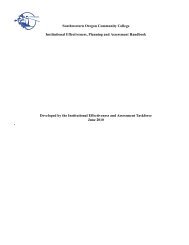
![SWOCC Viewbook [PDF] - Southwestern Oregon Community College](https://img.yumpu.com/26373688/1/190x245/swocc-viewbook-pdf-southwestern-oregon-community-college.jpg?quality=85)

